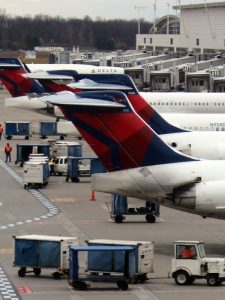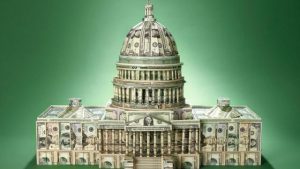 Got a connecting flight? As long as you’re continuing with the same airline, the gate can’t be THAT far away, right?
Got a connecting flight? As long as you’re continuing with the same airline, the gate can’t be THAT far away, right?
 Not anymore. If you’ve flown through Detroit lately, you’re familiar with Delta’s McNamara Terminal. With 121 gates, the terminal boasts of 1.5 miles of moving walkway. That’s the good news. The bad news is that your connecting gate may be 1.5 miles away. Since merging with Northwest, Delta dominates flights through Detroit. Or how about Atlanta? Delta flies out of every one of Atlanta’s seven terminals, spread over nearly seven million square feet—60% larger than the Mall of America
Not anymore. If you’ve flown through Detroit lately, you’re familiar with Delta’s McNamara Terminal. With 121 gates, the terminal boasts of 1.5 miles of moving walkway. That’s the good news. The bad news is that your connecting gate may be 1.5 miles away. Since merging with Northwest, Delta dominates flights through Detroit. Or how about Atlanta? Delta flies out of every one of Atlanta’s seven terminals, spread over nearly seven million square feet—60% larger than the Mall of America
Delta, now the oldest American airline (1924), was built from parts of Chicago and Southern, Northeast, Northwest, Republic, Hughes Airwest, Bonanza, Pacific, West Coast, North Central, American Overseas, National, Western and Standard airlines plus Southern, Pan American World, and Atlantic, Gulf, and Caribbean airways. Ranked by total passengers, Delta was the largest airline in the world in 2014.
Southwest, United and American fill out the list of the top four domestic carriers (China Southern, #3, completes the global top five). The domestic airline industry is now dominated by four carriers. Go back a decade and the list would have included US Airways, Continental, Northwest, AirTran and America West, all absorbed by the final four. Among them they made a profit of $24 billion last year, more than ridiculously profitable Alphabet (Google’s parent).
The March 26 issue of The Economist shines a light on U.S. corporate profitability and its cause, a lack of competition. The cover reads Winners Take All. It isn’t just the airlines that are making lots of money. U.S. domestic corporate profits are near 7% of GDP, close to the record. It’s a pretty wonky article, but worth a careful read.
Permit me to jump to a few conclusions. The surprising durability of the Trump and Sanders campaigns can be partly explained by these trends. Voters are weary of being pawns in a game played by others. Trump voters seem to think that if they’re getting beat up by corporate titans, maybe they need to elect one to fight back. Sanders voters are on a nostalgia trip, believing that the clock can be turned back to 1960, when labor had the power to balance capital and that wage and benefit regulation can undo both technology’s labor-displacement and a massive increase in the global supply of labor.
 What’s wrong with industry is the $10 trillion in corporate mergers since 2008 that have empowered firms to take over competitors and build protection (what Warren Buffett calls “moats”) around their core business. Protection can be a critical network of patents like big pharma, the “network effect” of a company like Facebook, or a dominant control of a key asset, such as Google’s control of search data. The Economist calculates that 2/3 of the economy’s 900-odd sectors became more concentrated between 1997 and 2012. The share of business going to the top 4 firms in each sector rose nearly a quarter (from 26% to 32%). And the flip side: The share of revenue in fragmented sectors fell from 72% to 58%.
What’s wrong with industry is the $10 trillion in corporate mergers since 2008 that have empowered firms to take over competitors and build protection (what Warren Buffett calls “moats”) around their core business. Protection can be a critical network of patents like big pharma, the “network effect” of a company like Facebook, or a dominant control of a key asset, such as Google’s control of search data. The Economist calculates that 2/3 of the economy’s 900-odd sectors became more concentrated between 1997 and 2012. The share of business going to the top 4 firms in each sector rose nearly a quarter (from 26% to 32%). And the flip side: The share of revenue in fragmented sectors fell from 72% to 58%.
Monopolists are difficult to fight, at least with existing weapons. Trust-busters’ efforts to break up IBM and Microsoft took forever, cost fabulous sums and ultimately failed. Targeted firms unleash armies of attorneys and lobbyists, tying regulators up in knots.
If efforts to split a single dominant firm are doomed, our laws are even less well-suited to tackle a sector with only a handful of firms. Students of economic history might think of the paper industry. Dominated by a few big firms, paper silently collaborated on price for decades without committing an indictable offense. The Sherman Antitrust Act of 1890 and the Clayton Act of 1914 are due for an overhaul—perhaps a complete re-think.
 And there’s the money problem. This is the season for hand-wringing about contributions to political campaigns, but the role of corporate money is much more insidious. Reinforcing campaign cash is the army of Washington influence peddlers. A study published by the Sunlight Foundation estimated that the industry engaged in “policy advocacy” (a broader definition than legally-reported lobbying) spent $6.7 billion in 2012, half a billion more than the record-setting mountain of campaign money spent that presidential year. Alphabet (Google, right?) spent $17 million on lobbying all by itself in 2015. Overt preferences for firms or industries are slid into complex statutes just before the vote; arcane laws get passed with deviously anticompetitive effects. Can this be changed? Unfortunately, all of this financial firepower will be aimed squarely at any effort to restrain it.
And there’s the money problem. This is the season for hand-wringing about contributions to political campaigns, but the role of corporate money is much more insidious. Reinforcing campaign cash is the army of Washington influence peddlers. A study published by the Sunlight Foundation estimated that the industry engaged in “policy advocacy” (a broader definition than legally-reported lobbying) spent $6.7 billion in 2012, half a billion more than the record-setting mountain of campaign money spent that presidential year. Alphabet (Google, right?) spent $17 million on lobbying all by itself in 2015. Overt preferences for firms or industries are slid into complex statutes just before the vote; arcane laws get passed with deviously anticompetitive effects. Can this be changed? Unfortunately, all of this financial firepower will be aimed squarely at any effort to restrain it.
The corporate game is global, too. Regulation can’t simply apply to American companies, as we’ve learned from the rash of corporate “inversions,” where U.S. firms buy foreign firms and “re-flag” to escape U.S. corporate taxes. This is a global problem that begs for a global solution, a solution in which America must lead the way.
Neither isolationism nor nostalgia are the answer. The anger of the electorate, confronting shrinking opportunity for the many in the face of growing wealth for the few, will demand action. For such a complex set of problems, however, populist fervor could easily be channeled into laws that would make matters even worse.